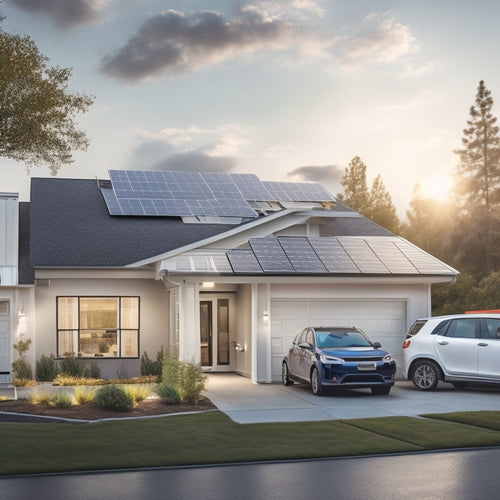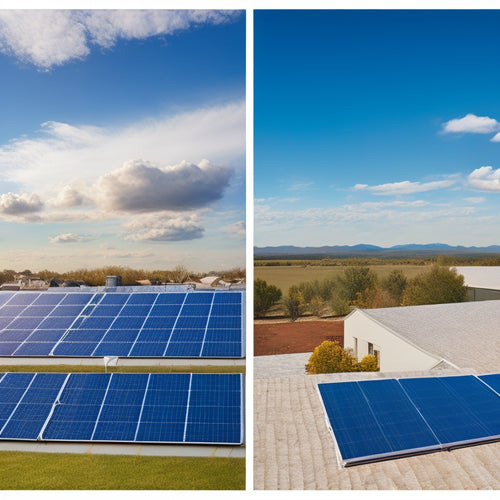
Cleaning and Maintaining School Solar Panels 101
Share
As you invest in solar power for your school, prioritizing cleaning and maintaining your solar panels is crucial to maximize their energy generation and contribute to a sustainable future. Clean panels can lead to significant energy savings, reducing your school's energy expenditure. You'll need to choose a cleaning method, wear proper safety gear, and schedule regular cleaning tasks. By monitoring energy output performance and analyzing data, you can identify trends and optimize energy production. As you take the first step towards maintaining your school's solar panels, you'll uncover more ways to guarantee peak energy production and a sustainable tomorrow.
Key Takeaways
• Clean solar panels maximize electricity generation, leading to significant energy savings and a reduced energy expenditure for schools.
• Regular cleaning schedules, ideally every 6-12 months, are crucial to maintain optimal energy output and prevent panel degradation.
• Safety precautions, including wearing PPE and de-energizing the system, are essential during maintenance to prevent injuries and electrocution.
• Monitoring energy output performance through data analysis and visualization helps identify trends, patterns, and anomalies, ensuring optimal energy production.
• Proper maintenance, including cleaning and inspections, helps prevent common issues like dust accumulation, panel degradation, and bird droppings, ensuring peak energy production.
Importance of Clean Solar Panels
As you work to optimize your school's solar panel system, you'll want to prioritize cleaning to reap the benefits of energy savings.
When solar panels are clean, they can generate electricity at their maximum capacity, leading to significant energy savings. This not only reduces your school's energy expenditure but also contributes to a more sustainable future.
Clean solar panels also have a direct impact on environmental benefits. By maximizing energy output, you're reducing your reliance on fossil fuels and decreasing your carbon footprint. This, in turn, helps combat climate change and promotes a healthier environment for your students and the community.
Cleaning Methods for Schools
When it comes to cleaning your school's solar panels, you'll want to select a method that effectively removes dirt and debris without damaging the equipment or compromising its performance.
There are several cleaning methods to contemplate, each with its own advantages and drawbacks. The most common method is using water and a soft-bristled brush to gently remove dirt and debris. This method is effective and gentle on the panels, but it does require a significant amount of water, which may not align with your school's water conservation efforts.
Another option is using a dry cleaning method, which utilizes a specialized cleaning solution and a microfiber cloth to remove dirt and debris. This method is more water-efficient and can be a great option for schools committed to green initiatives.
Additionally, consider employing automated cleaning systems that use minimal water and can be programmed to clean the panels at regular intervals.
Whichever method you choose, make sure to follow the manufacturer's guidelines and take necessary precautions to safeguard the safety of your solar panels.
Safety Precautions for Maintenance
As you prepare to maintain your school's solar panels, you must prioritize your safety above all else.
You'll need to don the right personal protective equipment (PPE) to shield yourself from potential hazards.
Additionally, you'll want to take electrical safety measures to prevent shocks, electrocution, and other accidents that can occur when working with electrical systems.
Personal Protective Equipment
You must wear personal protective equipment (PPE) such as gloves, safety glasses, and a hard hat to prevent injuries from falling objects, electrical shock, and other hazards when maintaining school solar panels. This is essential to guarantee your safety while working at heights or with electrical systems.
When it comes to eye protection, you'll need safety glasses or goggles that meet the ANSI Z87.1 standard. These will shield your eyes from debris, chemical splashes, and other hazards.
For hand protection, choose gloves made from durable, puncture-resistant materials like nitrile or neoprene. These materials will provide a good grip on slippery surfaces and protect your hands from cuts and abrasions. Additionally, consider gloves with textured palms to improve grip on smooth surfaces.
Electrical Safety Measures
To prevent electrical shock, make sure the solar panel system is de-energized before starting maintenance, and verify the voltage is zero using a voltage tester or multimeter. This critical step guarantees your safety while working on the system. You don't want to risk getting electrocuted, so take your time and follow the proper procedures.
When it comes to electrical safety, you can't be too careful. Here are some key precautions to keep in mind:
-
Identify Shock Hazards: Be aware of exposed electrical components, such as wiring and connectors, which can cause electrical shock.
-
Arc Flash Protection: Wear appropriate personal protective equipment (PPE) to protect yourself from arc flash hazards, which can occur when electrical energy is released.
-
Lockout/Tagout: Ensure that the system is properly locked out and tagged to prevent accidental startup during maintenance.
Scheduling Regular Cleaning Tasks
How frequently should you schedule cleaning tasks to guarantee peak energy output from your school's solar panels? The answer depends on various factors, including the local climate, panel angle, and surrounding environment.
As a general rule, it's recommended to clean your solar panels every 6-12 months, or more frequently in areas with high levels of air pollution or dust.
To make sure regular cleaning, allocate a specific budget for maintenance in your school's annual budget. Consider budget constraints when determining the frequency and scope of cleaning tasks. You may need to prioritize areas with the highest energy output or those most prone to soiling.
Effective staff allocation is also important. Designate a team or individual responsible for scheduling and performing cleaning tasks. This can be a facilities manager, a maintenance team, or even a group of environmentally conscious students.
Monitoring Energy Output Performance
As you monitor your school's solar panel performance, you'll want to track energy generation to identify trends and anomalies.
By analyzing key performance metrics, you'll be able to pinpoint areas for improvement and optimize energy output.
Energy Generation Tracking
You can monitor the energy output performance of your school's solar panels through regular tracking and analysis of key performance indicators (KPIs), ensuring peak energy generation and identifying potential issues early on. This involves monitoring energy output, comparing it to forecasts, and adjusting maintenance schedules accordingly.
To optimize energy generation, you'll want to:
-
Track energy output in real-time, comparing it to historical data and energy forecasting models to identify trends and anomalies.
-
Analyze energy output patterns to identify potential issues, such as soiling or shading, and schedule cleaning and maintenance accordingly.
-
Compare your school's energy output to grid parity, ensuring that your solar panels are generating energy at a rate that's competitive with traditional grid power.
Performance Metric Analysis
In monitoring energy output performance, your school's solar panel system generates a wealth of data, including metrics on energy production, consumption, and grid interaction, which can be analyzed to identify optimization opportunities. This data provides valuable insights into your system's efficiency, helping you pinpoint areas for improvement.
By leveraging data visualization tools, you can transform complex data into intuitive graphs and charts, making it easier to understand your system's performance.
In performance metric analysis, you'll examine key performance indicators (KPIs) such as energy yield, capacity factor, and performance ratio. These metrics help you gauge your system's energy output, identify trends, and detect anomalies.
Energy forecasting, another critical aspect of performance analysis, enables you to predict energy production based on historical data and weather patterns. This allows you to optimize energy usage, reduce energy waste, and maximize your system's potential.
Output Variance Detection
By tracking energy output variation over time, you'll detect anomalies that indicate potential issues with your school's solar panel system, enabling swift corrective action to maintain peak performance.
Monitoring energy output performance helps identify subtle changes that might otherwise go unnoticed, allowing you to take proactive measures to optimize your system's efficiency.
To achieve this, you can leverage advanced analytics tools that employ:
- Predictive modeling to forecast energy output and detect deviations from expected performance
- Data mining techniques to uncover patterns and trends in energy output data
- Weather analytics to account for environmental factors that impact energy production
Common Issues to Watch For
As you maintain your school's solar panels, it's crucial to keep an eye out for common issues that can impact their performance.
Dust and debris accumulation, a common issue in solar panel maintenance, can greatly reduce energy output if left unchecked. When dust and debris settle on the panels, they block sunlight, reducing the energy generated. Regular cleaning can help mitigate this issue, guaranteeing peak energy production.
You should also be on the lookout for panel degradation, which can occur due to natural wear and tear or environmental factors. As panels degrade, their efficiency decreases, leading to reduced energy output. Regular inspections can help identify degradation early on, allowing for prompt repairs or replacements.
Another issue to watch for is bird droppings, which can be particularly problematic if they're not cleaned regularly. Bird droppings can corrode the panels' surface, causing permanent damage and reducing their lifespan.
Frequently Asked Questions
Can Schools Clean Solar Panels During Peak Sun Hours?
You should avoid cleaning solar panels during peak sun hours to maintain energy efficiency, as it may cause schedule conflicts and safety precautions; instead, schedule cleaning during early morning or late afternoon to maximize educational opportunities while considering cost considerations.
Are There Specialized Cleaning Products for School Solar Panels?
When you're sourcing cleaning products for your school's solar panels, look for specialized solutions that prioritize Panel Safety and Product Efficacy, ensuring a gentle yet effective clean that won't void warranties or damage sensitive components.
Can Students Participate in Solar Panel Cleaning Activities?
You can empower students to take charge of solar panel cleaning, fostering hands-on learning, STEM education, and community engagement while promoting environmental awareness, all while instilling a sense of ownership and responsibility.
How Often Should Schools Inspect Solar Panel Mounting Systems?
Did you know that 1 in 5 solar panels are damaged due to improper installation? You should inspect solar panel mounting systems quarterly to guarantee structural integrity and adhere to safety protocols, preventing potential hazards.
Do Schools Need Special Licenses for Solar Panel Maintenance?
You'll need to check local regulations, but typically, schools don't require special licenses for solar panel maintenance, as long as you guarantee permit requirements are met and adhere to regulatory compliance guidelines.
Related Posts
-

What Electric Vehicle Owners Need for Home Energy
As an electric vehicle owner, you need to optimize your home energy system to guarantee efficient, sustainable, and c...
-

Top Online Stores for Solar Car Accessories
When searching online for solar car accessories, you'll find top retailers like Amazon, REI Co-op, and Best Buy offer...
-

Tracking Solar Panels Vs Fixed Panels Cost Savings
When considering solar panel options, you'll want to weigh the cost savings of tracking solar panels versus fixed pan...


